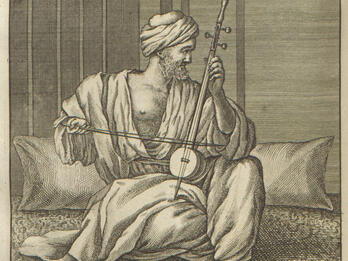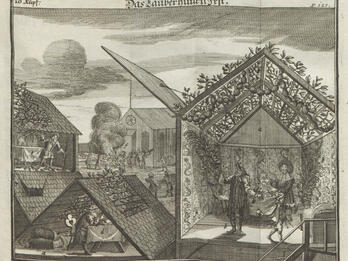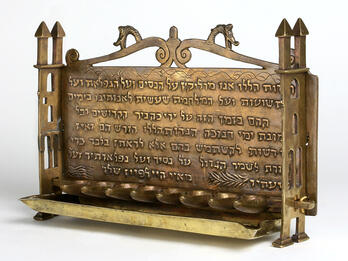Livyat ḥen (Ornament of Grace)
Chapter Three: Explaining the Types of Poetry
Type 1
A simple four-syllable poem, where each of the four members of the line has four tenu‘ot,1 with no yated.2 In some of them, the members do not rhyme, as in this line by R. David ibn Yaḥya, of blessed memory:
’Ashré adam | shomea‘ li | lishqod ‘al dal- | totai yom yom
(Happy is the person that listens to me, waiting at my doors each day.)
In others, the two first members rhyme, as in this line by Maimonides, of blessed memory:
De‘i holekh | lanḥot derekh | yashar lislol | ’et maslulah
(My mind goes forth to lead the path of the upright, to pave its road.)
In others, the halfway point of the line rhymes with the end of the line, such is in this poem by R. Elijah, of blessed memory:
’Ashira na | shir nikhbadot | ba’er hetev | ’uvli ḥidot
Va’va’er ‘e- | ser hanquddot | ’ekh neḥlaqu | lishté yadot
(I shall sing a glorious song, very clearly, without riddles;
I will explain the ten vowel signs, how they divide into two classes.)
In yet others, the first three members rhyme, following the custom of most four-syllable poems, whereas the fourth member [the last of the first line] rhymes with the eighth [the last of the second line]:
ḥokhma rama | tarbé ‘otsma | gam ki ‘immah | kol hon ‘ateq
Betah shokhen | kavod ’uvkhen | ḥevlo hakhen | lo yinnateq.
(Lofty wisdom gives increased strength, and with her are all enduring riches.
Glory dwells at her house; therefore, establish its cord, so that it not snap.)
Type 2
Is composed of a yated and four tenu‘ot [in each member]; the first three members rhyme, and the fourth rhymes with the eighth, as in this line by R. Solomon ibn Gabirol, of blessed memory:
Shemor libbi ma‘né | heyé bim’od na‘ané | yera ha’el ’umné | devarav haysharim
Vehu yislaḥ ’ashma | vehu yarbé ‘otsma | vehu yitten ḥokhma | lehavin nimharim
(O my heart, uphold the response,3 be very humble; fear God, and enumerate His upright words.4
He will forgive iniquity, and He will give increased strength, and He will give wisdom to make rash people understand.)
Type 3
Is composed of a yated and four tenu‘ot, a yated and two tenu‘ot, as in this line by R. Elijah, of blessed memory:
Beqol tsohla varon zemir ’‘né | sheva bitnu‘ato lekha ’emné
Beshalosh ofannim qeri’ato | uvahem yitḥallef veyishtanné.
(With a voice of mirth and joyous song I call out; I list the sheva5 in its pronunciation;
It can be read in three fashions; it varies and differs between them.)
Type 4
Is composed of a yated and two tenu‘ot, a yated and two tenu‘ot, a yated and a tenu‘a, as in this line:
Beni shura vequḥ kayyom teshura | veshai me’av bekha nafsho qeshura.
(My son, look, and take my gift today; and take a present from your father, whose soul is bound up in yours.)
Type 5
Is composed of a yated and two tenu‘ot, a yated and two tenu‘ot, such as this line:
’adon ‘olam ’asher malakh | beterem kol yetsir nivra
Be‘et na‘sa beḥeftso kol | ’azai melekh shemo niqra
(The eternal Lord, who reigned when no being had yet been created.
When all were made according to His will, then His name was called “king.”)
Type 6
Is composed of a yated and a tenu‘a, a yated and two tenu‘ot,6 | a yated and a tenu‘a, a yated and two tenu‘ot, as in this line by [Moses] Ibn Ezra, of blessed memory:
Beshem ’el ’asher yatsar veha‘oz le’imrotav | ve‘arakh veyatsar kol vekhilla pe‘ullotav
(In the name of God, who created, and whose utterances have power; He set up and created everything, and then concluded His deeds.)
Notes
[I.e., single syllables.—Trans.]
[Literally “spade,” i.e., a consonant plus short vowel (sheva or ḥataf), followed by a full syllable; for example, the Hebrew word lekha (where le- has a sheva, and kha is the full syllable). The initial consonant plus short vowel are the “handle” of the shovel, and the following full syllable is the business end. Throughout this passage, we will be indicating the Hebrew short vowels with superscript letters in our English transliteration.—Trans.]
[I.e., the response that the Israelites said to God at Mt. Sinai: We will do and we will hear (Exodus 24:7).—Trans.]
[I.e., the commandments. The line is taken from the opening of Ibn Gabirol’s Azharot poem, which enumerates all the commandments of the Law.—Trans.]
[The name of the short vowel; see above, note 2.—Trans.]
[We have inserted a vertical bar in the middle of the description of this meter, because the line is so long.—Trans.]
Credits
Immanuel Benevento, Livyat ḥen (Ornament of Grace) (Mantua: 1547), 105b–106b.
Published in: The Posen Library of Jewish Culture and Civilization, vol. 5.





